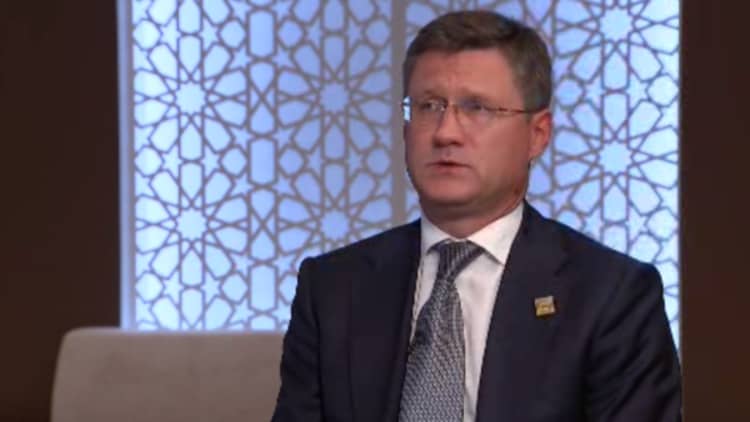
Russian Energy Minister Alexander Novak has his focus on longer-term market factors rather than President Donald Trump's tweets, he said Thursday.
Asked about his reactions to the U.S. president's social media missives, which often target OPEC policies and are known to move markets without warning, Novak told CNBC's Hadley Gamble: "You know, we are looking at all the factors that one way or another effect the prices. But in particular for us, it's the balance between supply and demand."
"With regards to (Trump's) statement, we see that at the time of the statement the price goes up or down but after a while returns to where it was," he added in the exclusive interview.
"Therefore, in my view, these are not fundamental factors. Fundamental factors do not lie in words but actions."
His comments come shortly after the conclusion of the Joint Ministerial Monitoring Committee (JMMC) in Abu Dhabi, with OPEC allies agreeing to ask over-producing members to bring production back in line with their targets.
The full coalition of OPEC and non-OPEC partners — sometimes referred to as "OPEC+" — will next meet in Vienna in early December to decide whether any further action to stabilize oil markets is required for 2020.
The group has struggled to shore up oil prices this year, amid booming U.S. production and a slowing global economy.
It has called into question whether OPEC+ really wields that much influence over oil markets.
Oil prices
The group, which consists of some of the world's most powerful oil-producing nations, agreed to reduce output by 1.2 million barrels a day at the beginning of 2019. That deal replaced a previous round of production cuts that began in January 2017.
Some members, such as Iraq and Nigeria, have been producing above their quota in recent months.
Sitting alongside Iraq's oil minister, Thamer Ghadhban, at a press conference on Thursday, Russia's Novak stressed it was "extremely important" that all members signed up to the OPEC-led production cuts were fully compliant.
Ghadhban promised Iraq would introduce deeper cuts from October 1 "in order to reach full conformity."
International benchmark Brent crude was trading at $59.59 a barrel Thursday afternoon, down more than 2%, while U.S. West Texas Intermediate (WTI) stood at $54.76 a barrel, down around 1.8%.
Brent futures have tumbled more than 18% from a peak reached in April, with WTI down over 15% over the same period.



